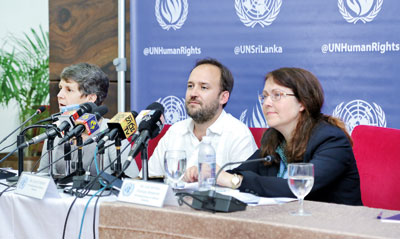News
UN finds prisoners sans legal aid till summoned to the dock
View(s):A visiting UN working group found this week that most remand prisons across the country are overcrowded over proportionally and both convicted persons and detainees are held under the same facilities.

UN working group addressing a news conference
“Long term prisoners and people serving a life sentence are held in harsh conditions with limited time for family visits, lack of opportunities to work and participate in other vocational, educational or recreational activities, and limited out-of-cell time” the UN working group said in its findings while urging the Government to ensure that the prison system is aimed at the rehabilitation and reintegration of inmates.
The three member UN working group on arbitrary detention released its preliminary findings on Friday after concluding its ten day visit to Sri Lanka this week following an official invitation extended by the government.
The three-member delegation of the UN Working Group on Arbitrary Detention consisting of José Antonio Guevara Bermúdez, Leigh Toomey and Elina Steinerte visited a range of places where people are held, including prisons, police stations and institutions for juveniles, migrants and people with psychosocial disabilities to gather first hand information. The working group also visited the western, north-central, northern, eastern, southern and central provinces, where they met government officials, civil society groups and other relevant stakeholders.
While noting that the number of arrests made under the Prevention of Terrorism Act (PTA) has dropped significantly since 2015, the working group expressed “grave concerns” about the numerous severe restrictions to fair trial guarantees that the application of the PTA entails.
“For example, under Part II of the PTA, a suspect does not have the right to legal assistance until the court proceedings commence. In practice, this means that any statements, including confessions, which normally form an essential part of the prosecution under the PTA, are given in the absence of lawyers. The working group recorded numerous instances where those convicted under the PTA had allegedly been subjected to harassment, intimidation, threats and even ill-treatment and torture to extract confessions,” the working group noted in its preliminary findings.
The working group also found that there were numerous instances reported of confessions written in Sinhalese signed by suspects who did not understand that language. “The working group was informed that this practice is ceasing and that instead, the Tamil suspects are forced to write and sign their own confessions in Tamil to avoid any accusations over their ability to speak Sinhala.”
The working group said that it is of the view that the absence of a lawyer at the time of the police recording statements under the PTA is a crucial factor, which contributes to the risk of confessions extracted under ill-treatment and torture.
The working group strongly urged the government to review this practice to guarantee all suspects, irrespective of the charges, immediate access to a lawyer free of charge while ensuring any confessions should only be recorded in front of the judge.
One among the other grave concerns raised by the UN working group is the right to challenge the legality of detention which is currently not effectively guaranteed.
“The lack of legal assistance guaranteed to all detainees from the moment of arrest, the unjustified delay in criminal proceedings and judicial remedies for the protection of fundamental rights, the excessive use of pre-trial detention, the lack of effective access to bail or other alternatives to detention, and the practice by police of obtaining statements without the presence of a lawyer and through coercion, are some of the abuses that could be prevented if an effective control of the legality of detention by the judiciary was in place,” the working group found noted in its preliminary findings report.

